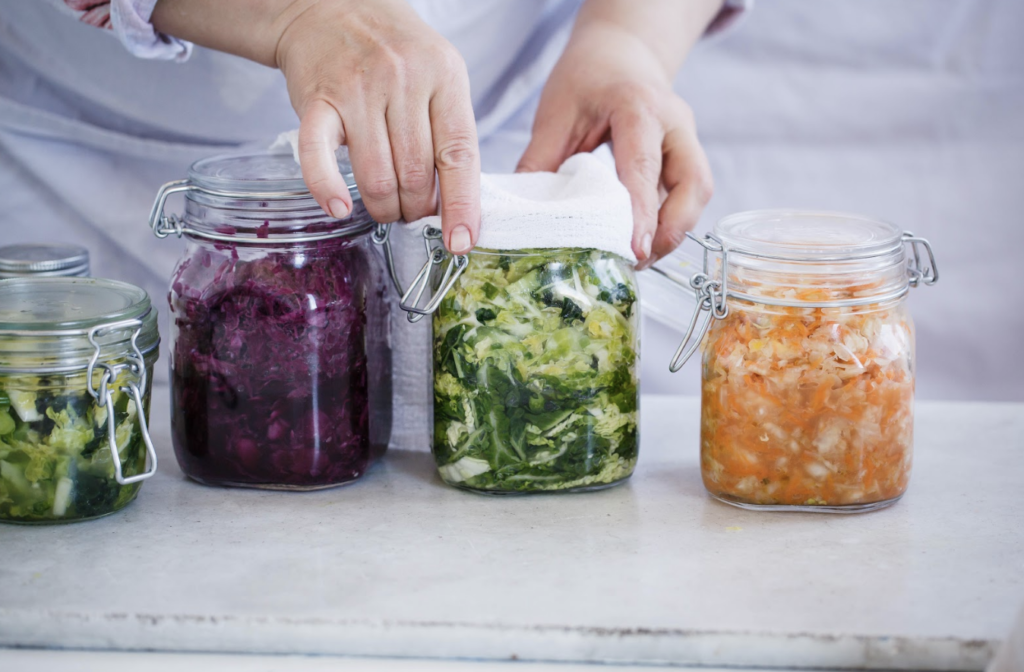Are internal or topical probiotics for acne viable options?
Acne can be one of the most annoying conditions, and sometimes it follows people through many stages of life. It is assumed that only teenagers experience symptoms of acne, but many adults suffer from it as well. Hormones, PMS, diet and other unknown factors can play a part in the development of acne.
Some research shows that probiotics are great for acne and may reduce side effects of the skin disorder, though there are some questions about how that process occurs and the interaction between acne and probiotics. Have no fear: we review the known (and the rumored) in probiotics for acne.
What causes acne?
Acne, or acne vulgaris, is a skin condition that occurs when hair follicles become clogged with oil and dead skin cells. This results in buildup, inflammation, pimples, white and blackheads, and even cystic acne.
Acne can appear all over the body, commonly on the face, shoulders, back, neck, arms and chest. In many different forms, it is irritating and sometimes painful. Acne commonly appears during puberty, but can show up at any age.
Like many skin conditions out there, acne has several possible causes. Acne symptoms may be a direct effect of your lifestyle or stress levels in your life.
Hormonal changes during teen years can result in acne breakouts, and if you go through any hormonal changes as an adult, acne can still appear. For instance, women may have acne during menstruation, pregnancy, or menopause. Other factors can cause acne such as stress, genetics, allergic reactions, medication, or diseases. (1, 2)
Additionally, bacteria is one of the causes of acne breakouts. Research states that the severity of acne may depend on the type of bacteria in blemishes. While not all bacteria is bad, some types are harmful.
One 2013 study associates acne with Cutibacterium acnes (previously known as Propionibacterium acnes), a specific type of bacteria known for its unique behaviors. As you might have guessed, it’s not the only cause of acne breakouts. (3)
Another study exploring the antimicrobial effects of Thai medicinal plants against acne-inducing bacteria suggested that, “Cutibacterium (Propionibacterium) acnes and Staphylococcus epidermidis have been recognized as pus-forming bacteria triggering an inflammation in acne.” (4, 5)
What are probiotics?
Probiotics are live, healthy bacteria that may contribute to the improvement of your overall health as they support better gut health. This type of bacteria is naturally occurring, but also exists in fermented foods. Your body is full of friendly bacteria, both internal and external, that help it to function properly.
Two commonly known types of friendly gut bacteria in probiotics are Lactobacillus strains and Bifidobacterium. Probiotics may help to promote the growth of more beneficial bacteria in our bodies, particularly in the gut. The bacteria in our gastrointestinal system are called gut flora.
Flora can aid the body in digesting food and strengthen the immune system, 70-80% of which is housed in the gut. When taken, current research suggests that probiotics go to war with the “potentially problematic” bacteria in your digestive system, balancing the gut microbiome and reducing inflammation.
You can acquire probiotics from supplements or fermented foods. Some probiotic foods include yogurt, sauerkraut, kimchi, and kombucha. This kind of bacteria can do wonders for maintaining good digestive health.

The live cultures in probiotics have been known to contribute to the treatment or prevention of disorders such as IBS, diarrhea, leaky gut, and other issues of the digestive tract, which have been connected to acne symptoms. (6)
Are probiotics good for acne?
The benefits of probiotics may be noticeable for gut health, but can they serve as an acne treatment or pave the way to clear skin?
Current research does not fully explain the interaction between acne flare-ups and probiotics, but it does show a connection between the two.
There are two ways to use probiotics in the treatment of acne: topically and internally. When used topically, or applied to the skin’s surface, probiotics can act as a helper in the skin’s protective shield, striving to keep in a favored balance over “unwanted” microorganisms.
When taken internally, as a supplement or eating fermented foods, probiotics can help balance the ratios to more favorable bacteria inside your body. As we have seen before, inflammation in the gut can actually trigger skin inflammation. With a balanced gut-skin connection, you can reduce your body’s overall inflammation and even prevent acne from forming.
Supporting Research on Probiotics for Acne
A 2011 study revisiting the work of dermatologists John H. Stokes and Donald M. Pillsbury concluded that, while acne is not a disease of the gastrointestinal tract, it is connected to the gut.
They stated, “There appears to be more than enough supportive evidence to suggest that gut microbes, and the integrity of the gastrointestinal tract itself, are contributing factors in the acne process.” (7)
Studies have shown that probiotics have successfully treated inflammatory skin issues, such as atopic dermatitis, especially in children. Skin prone to acne or rosacea has shown improvement with probiotic use as well. (8)
Remember when we discussed the bacteria Cutibacterium? A recent scientific study, published in 2018, explored the effects of taking probiotics on C. acnes. Scientists observed that as “good” bacteria were applied topically, levels of C. acnes decreased. They further noted that results were better when consistent upkeep of the skin’s microbiome occurred. (9)
Which probiotic strains should I take?

There are hundreds of probiotic strains to consider, and mixed opinions on which ones are the best to take. Recommended strains, and potentially the best probiotics, include:
-
- Lactobacillus acidophilus
- Lactobacillus paracasei
- Bifidobacterium bifidum
- Saccharomyces boulardii
- Streptococcus salivarius
All of these have been tested and found to be beneficial for a healthy gut and skin health.
You can take supplements of probiotics in capsule form as well as liquid oral probiotics. Remember that, in addition to probiotic supplements, the consumption of fermented foods can be helpful. These might be great substitutes for people with a higher skin sensitivity, who want to stay away from harsh acne products.
Always consult your physician before taking any probiotic supplements, regardless if used internally or topically to treat acne. Do your research and get high quality supplements for your microbiome and to promote healthy skin. (10, 11)
In Summary
- Acne is a skin condition present in many Americans, young and old.
- Probiotics are live, healthy bacteria. They are the friendly bacteria that promote digestive health through anti-inflammatory and anti-microbial properties, which in turn apply to your skin.
- The more your microbiome is maintained, the less you deal with bacteria-caused acne breakouts.
- Probiotics can be applied topically or internally. They can be purchased as skin care products, fermented foods, and supplements. Specific strains of probiotics may be more helpful when treating acne patients.
Sources:
- Arora, Megha Kataria, Amita Yadav, and Vandana Saini. “Role of hormones in acne vulgaris.” Clinical biochemistry 44.13 (2011): 1035-1040. Abstract: https://www.ncbi.nlm.nih.gov/pubmed/21763298
- Thiboutot, Diane. “Hormones and acne: pathophysiology, clinical evaluation, and therapies.” Seminars in Cutaneous Medicine and Surgery. Vol. 20. No. 3. 2001. Abstract: https://www.ncbi.nlm.nih.gov/pubmed/11594669
- Fitz-Gibbon, Sorel, et al. “Propionibacterium acnes strain populations in the human skin microbiome associated with acne.” Journal of Investigative Dermatology 133.9 (2013): 2152-2160. Abstract: https://www.ncbi.nlm.nih.gov/pubmed/23337890
- Chomnawang, Mullika Traidej, et al. “Antimicrobial effects of Thai medicinal plants against acne-inducing bacteria.” Journal of Ethnopharmacology 101.1-3 (2005): 330-333. Abstract: https://www.ncbi.nlm.nih.gov/pubmed/16009519
- Nishijima, Setsuko, et al. “The bacteriology of acne vulgaris and antimicrobial susceptibility of Propionibacterium acnes and Staphylococcus epidermidis isolated from acne lesions.” The Journal of dermatology 27.5 (2000): 318-323. Abstract: https://www.ncbi.nlm.nih.gov/pubmed/10875198
- Ukena, Sya N., et al. “Probiotic Escherichia coli Nissle 1917 inhibits leaky gut by enhancing mucosal integrity.” PloS one 2.12 (2007): e1308. Full Text: https://www.ncbi.nlm.nih.gov/pmc/articles/PMC2110898/
- Bowe, Whitney P., and Alan C. Logan. “Acne vulgaris, probiotics and the gut-brain-skin axis-back to the future?.” Gut pathogens 3.1 (2011): 1. Full Text: https://www.ncbi.nlm.nih.gov/pmc/articles/PMC3038963/
- Fuchs-Tarlovsky, V., Marquez-Barba, M. F., & Sriram, K. (2016). Probiotics in dermatologic practice. Nutrition, 32(3), 289-295. Abstract: https://www.ncbi.nlm.nih.gov/pubmed/26707956
- Porubsky, Caitlin F., et al. “The Role of Probiotics in Acne and Rosacea.” Probiotics-Current Knowledge and Future Prospects. IntechOpen, 2018. Full Text: https://www.intechopen.com/books/probiotics-current-knowledge-and-future-prospects/the-role-of-probiotics-in-acne-and-rosacea
- Mottin, Vitória HM, and Edna S. Suyenaga. “An approach on the potential use of probiotics in the treatment of skin conditions: acne and atopic dermatitis.” International journal of dermatology 57.12 (2018): 1425-1432. Abstract: https://www.ncbi.nlm.nih.gov/pubmed/29676446
- Fabbrocini, Gabriella, et al. “Supplementation with Lactobacillus rhamnosus SP1 normalises skin expression of genes implicated in insulin signalling and improves adult acne.” Beneficial microbes 7.5 (2016): 625-630. Abstract: https://www.ncbi.nlm.nih.gov/pubmed/27596801
